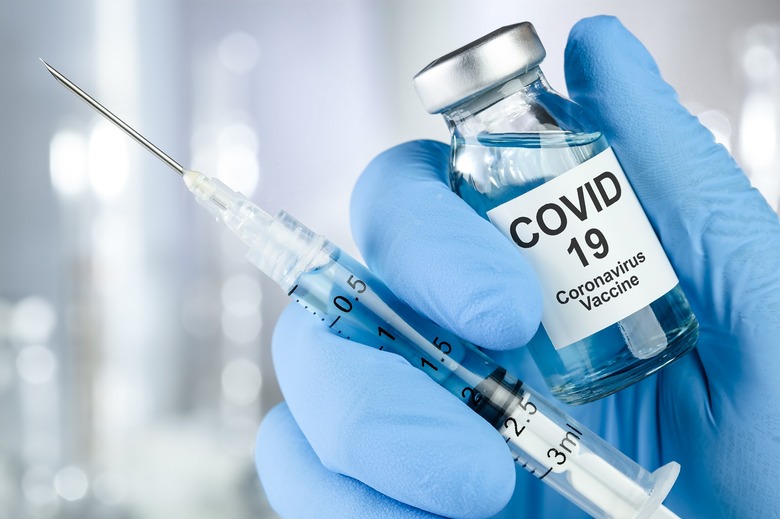There's One Major Problem With Coronavirus Vaccines
- Coronavirus vaccines from Pfizer and Moderna will hopefully put an end to the pandemic by late 2021.
- In the interim, some fear that the arrival of COVID-19 vaccines will make people take coronavirus safety precautions less seriously.
- The virus is still surging across the country, and healthy Americans may not have access to a vaccine until April.
There's a lot of well-founded optimism regarding new coronavirus vaccines from Pfizer and Moderna. And if all goes according to plan, we'll finally be able to put the pandemic behind us once and for all before 2022 rolls around, according to Dr. Fauci and several other health experts.
At the same time, the excitement surrounding COVID-19 vaccines shouldn't be an excuse for people to start taking coronavirus security precautions less seriously. On the contrary, adhering to guidelines like mask-wearing and social distancing is more important now than ever in light of the recent surge in new coronavirus infections, deaths, and hospitalizations. Recall, Dr. Fauci recently said that January could prove to be the worst month of the entire pandemic on account of the Thanksgiving and Christmas holidays.
All that said, some experts have cautioned that we should be wary of "vaccine euphoria."
"We get so kind of blinded by vaccine euphoria — the light at the end of the tunnel — that we underestimate how long that tunnel is, and how dangerous that tunnel is", said Peter Sands, an executive director of the Global Fund to Fight AIDS, Tuberculosis, and Malaria.
Sands brings up an interesting point, namely that the road to defeat the coronavirus isn't necessarily a short one. On the contrary, a coronavirus vaccine can only combat the pandemic effectively if a majority of Americans choose to take it. According to Fauci, at least 75% of Americans will need to receive a vaccine if we want to put the coronavirus firmly behind us.
"I would think at least 75%," Fauci said a few weeks ago. "Hopefully close to 80-85%."
Additionally, because the coronavirus vaccine schedule requires two doses, it's going to take some time before enough of the vaccine can be manufactured to accommodate the entire country. In a best-case scenario, Fauci believes healthy Americans — which is to say younger adults with no underlying health conditions — might get access to a coronavirus vaccine by the end of March or early April.
"It really is going to depend on the efficiency of the rollout," Fauci said.
In a best-case scenario, we may not be able to realistically be able to move past the coronavirus until the end of summer or early fall of next year. And in the interim, the coronavirus will continue to wreak havoc across the country if people stop taking safety guidelines seriously.
William Hallman, a psychologist at Rutgers University and an expert in the study of the perception of risk, noted that the statistical risk of any given activity matters far less than "what you think the risk is." So "from a risk perception standpoint," he said, "there is a potential danger that people will now get vaccinated and think they are super-human and nothing can touch them, which is certainly not true."
Not only do the vaccines not prevent 100% of infections, it's still unclear whether they prevent infection and transmission of the virus that causes the disease, leaving the unvaccinated vulnerable. Health workers who are vaccinated will most likely follow public health guidance to continue wearing masks in public, but what of the rest of us?
It's also unclear, at this point, how long the vaccines last and can prevent infection once administered.
The larger takeaway here is that while vaccines will hopefully eliminate coronavirus outbreaks for good, it's important to remember that we're still a long way from that becoming a reality. Until then, people should remain vigilant about following COVID-19 safety guidelines and avoid any and all indoor gatherings if possible.
Lastly, one positive impact from the coronavirus vaccines is that it arguably signals a willingness from the American public to embrace science once again.
